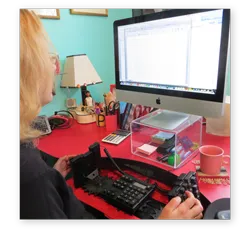FIND A LITERARY AGENT WHO IS RIGHT FOR YOU (AND YOUR BOOK): THREE TIPS
Most larger book publishers insist that you submit your book through a literary agent, although many smaller publishers do not. Agents are gatekeepers: They choose to represent only those books they feel have a decent chance of getting a book deal and an advance. When an in-house acquisitions editor receives a pitch from a literary agent well known to that editor, it’s as if the bouncer at a club just let you through the red velvet ropes. That’s because many agents have personal relationships with the editors in your genre who want to hear about the projects she is selling. If they don’t have relationships with the editors, but have a solid track record of selling books that have done well in the marketplace, an editor will want to get to know that agent and find out what projects she is pitching. Agents and editors cultivate relationships with each other when they realize they share similar tastes. Specializing in certain genres of books is efficient for everyone, so if you want to find a literary agent to represent you, keep in mind that you want one who has experience working with books like yours.
Where do you find a literary agent that is right for your book project? You can meet them at writers’ conferences (and learn a lot about book publishing and writing at the same time). You can research agents online or through www.publishersmarketplace.com and the acknowledgements section of books similar to the one you’re writing. (If you can’t think of any books similar to yours, check out my article on the comparative books list.) Publishers Marketplace will allow you to search a multitude of recent book deals (as well as other publishing information) for the low cost of $20 a month (and you can cancel your subscription at any time). You can research agents and editors in your genre, find out which agents and editors connected on specific books, and even, sometimes, figure out approximately how much of an advance the author received. Then too, the acknowledgements section of books will often list the names of literary agents because happy authors often like to publicly thank their agents. Don’t forget you can also search acknowledgments pages on Amazon.com and through Google Books. Type into the search bar “acknowledgements,” “thanks” and “thank you,” or even “agent” to find the names you’re seeking.
And how do you know a particular agent is right for you?
Tip 1: Look at the agent’s list. Ask to see a list of books she’s sold to publishers if that list isn’t available on her website. An in-house editor is no more impressed by an unsolicited submission from a self-appointed literary agent she doesn’t know and who hasn’t sold strong book projects than she is by an unsolicited submission from an author she doesn’t know and who hasn’t sold any books.
Tip 2: Listen to your gut.You have to feel confident that the agent understands your book and books similar to it. If she doesn’t, how will she sell it? If her editorial suggestions on your manuscript or book proposal don’t sit right with you, you don’t have to take them. You can try to find another agent. That said, don’t let your ego get in the way! Agents use book proposals as selling tools, and they keep up on what acquisitions editors are looking for, so don’t be too quick to dismiss an agent’s advice. A successful agent’s opinions about your book are shaped by her experiences, and if she’s sold books like yours to publishers, her professional advice may turn out to be absolutely invaluable.
You have to feel comfortable with the agent’s style of working with clients. You’re not looking for a friend who will reassure you that you’re a terrific writer; you’re looking for a busy, successful professional who will naturally limit her socializing with clients so that she can do what she was hired to do—sell!
Tip 3: Query more than one agent. It is acceptable to pitch to more than one agent at once. Why shouldn’t you give yourself some options? Send your book proposal to the first agent who responds to your query letter. If another agent responds, send the proposal to her, too, and let her know that another agent is interested and has requested the proposal. Yes, if you write a terrific query letter, you are likely to find a literary agent who expresses interest in seeing your book proposal.
Then too, if you’d like to ask me to help you strategize about what agents to approach and how long to wait for replies, you can always feel free to hire me as a book publishing consultant. Learn more on my services page.
Not sure you’re ready to send your book proposal to an agent? Have you begun the writing and conceptualizing of your book, and started to talk about it and write about it in person or online? You might be ready for a vision plan call with me to strategize your book writing and publishing plan. Check out the description and contact me through the contact form on my website (and yes, the details on that form help me to help you).
Want to know more about the books I’ve worked on? See my testimonials on my website.
Get more free advice from me! Follow me on Facebook.


Nancy Peske is a ghostwriter, developmental editor, and book publishing consultant who has done editorial work on books including bestsellers and award-winners for over 30 years.